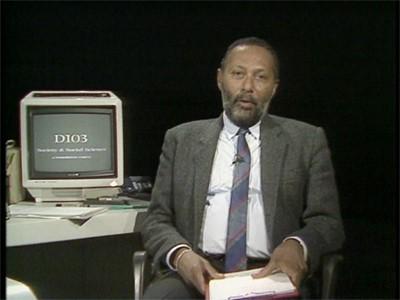You are here
- Home
- Year of Mygration
- Day 1, Year of #Mygration: 'The endless unfinished conversation of identity'
Day 1, Year of #Mygration: 'The endless unfinished conversation of identity'

One of the intellectual giants of the first 50 years of The Open University was the late Professor Stuart Hall. Courtesy of the Stuart Hall project trailer, we can hear his voice addressing migration and identity:
Extract from Jessica Evans’ perspective on Professor Stuart Hall
Originally posted on OpenLearn.
… Stuart's later work from the 90s onwards, on the relationships between identity, race and multiculturalism, was inflected by a psychoanalytically oriented examination of his own subjectivity. However, Stuart showed that his own personal trajectory lived out the complex interplay between class, colonial, racial and national allegiance and identities. Hence his commitment to the OU, born out of empathy with those who came to higher education from less usual, complex routes, just as his own difficult background in colonial Jamaica saw him come to England and Oxford University at the age of 19 on a Rhodes scholarship.
His history shows us exactly how the political and the personal are so entwined. In a number of gripping interviews Stuart tells us how he was the darkest skinned member of an aspiring middle-class Jamaican family, inheriting a mixed descent of Portuguese-Jewish, African and English in a culture where skin colour was freighted with distinctions cutting across class and colonialism. His mother had white ancestors and was in thrall to an imaginary distant England. His sister would say ‘where did you get this coolie baby from?’, meaning low class Indian, not black baby (Tim Adams, 'Cultural Hallmark 6').
Stuart’s mother forbade him from bringing black school friends home - even though to colonial eyes he was black himself - and she stopped Stuart's sister from seeing a black medical student. He said that his sister’s life was destroyed by this, causing a breakdown that was treated by electric shock after which she became a carer to their parents, never having another relationship again. Cultural studies, he said, was born out of the question of the contradictions lived out by his family – he could not understand then why his family pursued ‘the subaltern position, on the knees to the dominant culture’ (Tim Adams, 'Cultural Hallmark 6'). His sister’s life was ‘one of the reasons I have never been able to think or write about the individual separate from society. The individual is always living some larger narrative whether she likes it or not’ (Laurie Taylor’s Interviews: Stuart Hall 4).
Stuart had a classical English education in Jamaica, reciting English poems before knowing the names of Jamaican flowers, while allying himself with the struggle for independence from colonial rule. Needing to escape Jamaica’s colonial restrictions he got a Rhodes scholarship to study at Oxford University. He was as alienated there, finding himself taking on the persona of the West Indian diaspora despite not having ever met anyone from islands other than Jamaica. He left without completing his PhD, becoming the founding editor of the New Left Review, doing political campaigning and teaching, and later settling into another identity as a ‘black intellectual’.
Stuart’s major contribution to a multicultural conception of Britishness was based on the struggles of immigrant culture. Seeing Britain always as an outsider – even after living most of his life in Britain as a black person from a former colony he could not feel ‘English’ – is precisely what gives his writings an edge. For him, multiculturalism rests on inclusiveness but without an impossible imposition of mono-culture and a fantasy about the suppression of differences. So, the perceptions of outsiders, of those ‘others’ who were colonised, are a full part of their subjectivity and Stuart spelt out the dangers of a definition of ‘Britishness’ that seeks to erase this. And what he has to say about the definition of multiculturalism is pertinent for anyone with identities in transition, with twists and turns such as Stuart’s. Multicultural ethos, as he argued time and time again, imagines immigrants remaining true to themselves and to the traditions that they wish to retain at the same time as making adaptations to another culture and country; not one or the other…
Read more of Jessica's article on OpenLearn.
Quarterly Review of Research
Read our Quarterly Review of Research to learn about our latest quality academic output.

Contact our news team
For all out of hours enquiries, please telephone +44 (0)7901 515891
